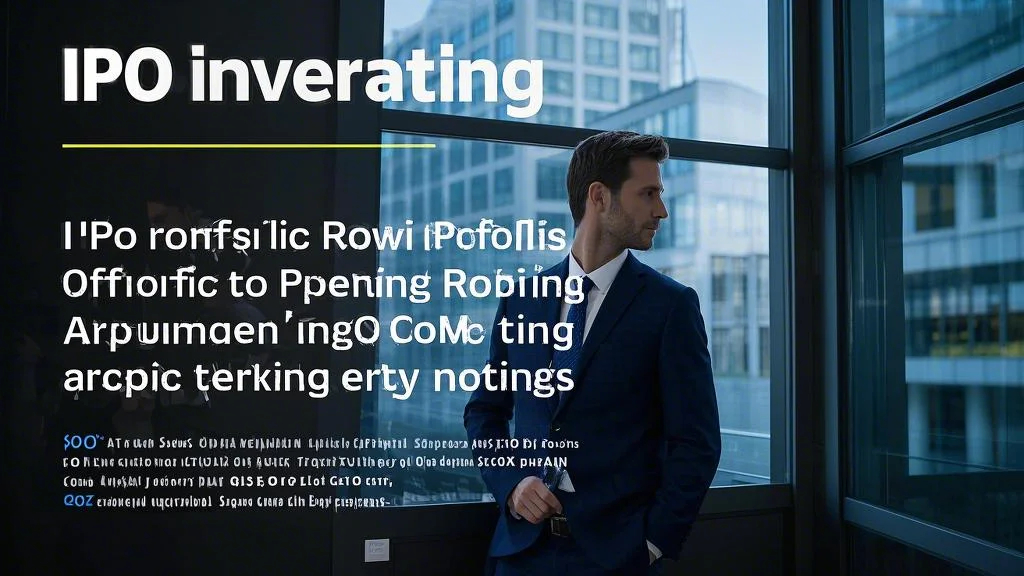IPO Investing: How to Profit from Public Offerings

What is IPO Investing and Why It Matters
IPO investing refers to the practice of buying shares of a company during its initial public offering (IPO), when it first lists its stock on a public exchange. This type of investment can be highly lucrative, as IPOs often generate significant media attention and investor interest, leading to substantial price increases in the early days of trading. However, IPO investing is not without risks. The hype surrounding a new listing can sometimes lead to overvaluation, and not all IPOs perform well in the long term. For investors, understanding the fundamentals of IPO investing is crucial to making informed decisions. This includes analyzing the company’s financial health, growth prospects, and market position, as well as evaluating the broader market conditions. By carefully assessing these factors, investors can identify opportunities to profit from public offerings while minimizing potential downsides.
The Appeal of Pre-IPO Stocks for Early Investors
For those looking to get in before the buzz of a public listing, pre-IPO stocks offer a unique opportunity. These are shares of a company that are sold privately before it goes public, often to institutional investors, venture capital firms, or accredited individuals. Investing in pre-IPO stocks can be highly rewarding, as early investors may benefit from significant price appreciation once the company goes public. However, this strategy comes with its own set of challenges. Pre-IPO investments are typically illiquid, meaning you may not be able to sell your shares until after the IPO. Additionally, valuing a private company can be difficult, as there is often limited financial data available. Despite these risks, pre-IPO investing can be a valuable addition to a diversified portfolio, particularly for those with a higher risk tolerance and a long-term investment horizon.
How Venture Capital Firms Profit from IPOs
Venture capital (VC) firms play a critical role in the IPO ecosystem, often reaping substantial rewards when their portfolio companies go public. These firms invest in startups during their early stages, providing the capital and support needed to grow and scale. When a startup eventually goes public, VC firms can realize significant returns on their investments. For example, best venture capital stocks often include shares of companies that were once VC-backed startups, such as Facebook, Uber, and Airbnb. The success of these investments highlights the importance of timing and strategic decision-making in venture capital. By identifying high-potential startups and nurturing them through their growth phases, VC firms can position themselves to profit handsomely from IPOs. For individual investors, understanding the strategies employed by top VC firms can provide valuable insights into the IPO market.

Hedge Fund Strategies for IPO Investing
Hedge funds are another key player in the IPO market, employing a variety of strategies to capitalize on public offerings. Some hedge funds focus on IPO investing by participating in the initial offering and holding shares for the long term, betting on the company’s growth potential. Others may engage in short-term trading, taking advantage of price volatility in the days and weeks following the IPO. Additionally, hedge funds often use sophisticated analytical tools to evaluate IPOs, assessing factors such as market demand, valuation metrics, and competitive positioning. These strategies allow hedge funds to navigate the complexities of the IPO market and generate returns for their investors. For individual investors, understanding how hedge funds approach IPOs can provide valuable lessons in risk management and market analysis.
Private Equity Exit Strategies and IPOs
For private equity (PE) firms, an IPO is often the culmination of a successful investment strategy. PE firms typically acquire companies with the goal of improving their operations, increasing profitability, and ultimately exiting the investment at a profit. An IPO is one of the most common private equity exit strategies, allowing the firm to sell its shares to the public and realize significant returns. However, the decision to take a company public is not taken lightly. PE firms must carefully consider market conditions, investor appetite, and the company’s readiness for public scrutiny. When executed successfully, an IPO can provide a lucrative exit for private equity investors while also offering the company access to additional capital for growth. For investors, understanding the role of private equity in the IPO process can provide valuable context for evaluating new listings.
Key Considerations for Successful IPO Investing
To succeed in IPO investing, it’s essential to approach each opportunity with a disciplined and informed strategy. Start by conducting thorough research on the company, including its financial performance, growth prospects, and competitive positioning. Pay close attention to the valuation, as overpriced IPOs can lead to disappointing returns. It’s also important to consider the broader market environment, as economic conditions can significantly impact the performance of new listings. Diversification is another key consideration; spreading your investments across multiple IPOs can help mitigate risk and increase your chances of success. Finally, be prepared to hold your investments for the long term, as the true value of a company may take time to materialize. By following these guidelines, you can navigate the complexities of IPO investing and position yourself for profitable outcomes.
Conclusion: Unlocking the Potential of IPO Investing
IPO investing offers a unique opportunity to participate in the growth of exciting new companies and potentially achieve significant returns. Whether you’re investing in pre-IPO stocks, learning from the strategies of best venture capital stocks, or exploring the role of hedge fund strategies and private equity exit strategies, there are numerous ways to profit from public offerings. However, success in this space requires careful research, disciplined decision-making, and a willingness to embrace risk. By understanding the dynamics of the IPO market and staying informed about new opportunities, you can unlock the full potential of IPO investing and build a portfolio that delivers long-term value.